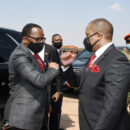We need to talk about Cyril: South Africa’ s Ramaphosa should face greater scrutiny over business and tax affairs – By Desné Masie

Oh the irony. In 1982, Cyril Ramaphosa, presided over the establishment of one of South Africa’s largest trade unions, the National Union of Mineworkers (NUM). Exactly thirty years later, Ramaphosa, in his capacity as board member of Lonmin PLC, presided over the worst state violence against civilians since apartheid, many of whom were NUM members, when police shot and killed 34 miners during the wildcat strike at Lonmin’s Marikana platinum mine.
Ramaphosa, currently the deputy president of South Africa, has a long history as a firebrand trade unionist, skilled negotiator and senior member of SA’s ruling party, the African National Congress (ANC). He was a key figure in South Africa’s transition to democracy in 1994. So how did Ramaphosa turn into a millionaire businessman with substantial assets allegedly stashed in tax havens?
Ramaphosa is accused of having sold out the Marikana miners, and while he has been cleared of criminal liability by the Farlam Commission, some of his most ardent critics – such as the Economic Freedom Fighters’ Dali Mpofu, who named him “˜accused number one’ in the “toxic collusion” between police, Lonmin and the State – insist Ramaphosa is ultimately responsible for their deaths.
With Jacob Zuma increasingly an absent president, and embroiled in the Nkandla controversy in which he is alleged to have spent US$23m of public funds on renovating his personal residence, Ramaphosa is becoming an increasingly powerful and controversial figure: he has represented Zuma at official functions, stepping in when the president is nowhere to be seen, and with his connections in the trade unions, business, and politics, and the likelihood that he is the next president, it’s time to talk about Cyril.
Cyril the Negotiator: Cosatu, the ANC and South Africa’s transition to democracy
Ramaphosa’s long political career started as a student politician in the 1970s, and by 1982 he had helped to establish the NUM, and in 1985, the Congress of South African Trade Unions (Cosatu), South Africa’s powerful union federation, currently in meltdown due to a spat with union Numsa (National Union of Metalworkers of SA). His ascendency to the upper echelons of the liberation movement and current ruling party, saw him on the National Reception Committee, which co-ordinated the release of Nelson Mandela. By 1991 Ramaphosa was elected general-secretary of the ANC.
During the period of South Africa’s transition to democracy, Ramaphosa soon established himself as a skilled negotiator and was a key figure in the Convention for a Democratic South Africa (Codesa) as well as in the bilateral talks with Roelf Meyer, a senior member of the National Party. The dialogue between Ramaphosa and Meyer was instrumental in bringing about an agreement between the NP and the ANC, and ultimately, the blueprint for South Africa’s Constitution and the start of its democratic era.
After losing the 1996 presidential competition to Thabo Mbeki, Ramaphosa concentrated his attention on his business interests, despite being perceived as Mandela’s favourite, and his election to the top of the ANC national executive in 1997.
Cyril the Tycoon: The tangled web of Shanduka, Lonmin and Marikana
Where to begin? The tangled web of business interests that form Ramaphosa’s empire have helped him to amass a fortune of an estimated $700m and made him one of Africa’s richest men. With companies spanning almost every conceivable sector of the economy from mining to financial services to McDonalds and CocaCola, it’s almost impossible to escape the net of Shanduka Group, the holding company that is the foundation of Ramaphosa’s business empire.
Ramaphosa’s good fortune has undoubtedly been helped along by his political and union connections as well as the country’s Black Economic Empowerment (BEE) legislation that has aimed to address past racial discrimination through affirmative action in job placement and procurement policies. This has contributed to the creation of a black oligarch class that has succeeded in winning government tenders and amassing holdings in corporations as well as extensive board memberships. It is hardly surprising that Ramaphosa is married to Tshepo Motsepe, who is the sister of fellow mining magnate and billionaire, Patrice Motsepe.
For Ramaphosa it all began with New Africa Investments Limited in the 1990s, with interests in MTN, a large telecommunications and mobile telephony company and culminated with Shanduka Group, which he founded in 2001, and which had a stake in Lonmin’s SA operations at the time of the Marikana massacre. Shanduka was founded as a black-owned investment holding company, and is invested in a diverse portfolio of listed and unlisted companies, with key holdings in the resources, food and beverage industries and has investments in South Africa, Mozambique, Mauritius, Ghana and Nigeria.
Following Marikana, the overlapping web of politics and business has been snapping at Ramaphosa’s heels. The Farlam commission revealed email correspondence that may be interpreted as him having unduly used his political influence on the police, and some have argued this is what led to the use of force on the miners. But testimony also revealed that the company paid millions in commissions to agents in the tax haven of Bermuda. Lonmin is thus alleged by the economist Dick Forslund to have used transfer pricing to shift profits. It is this allegation, that Ramaphosa may have assets stashed away in tax havens, and not the Marikana massacre itself, that may yet be his undoing, if found to be true.
Forslund argues that “the amounts were shifted from Lonmin’s South African operations so as not to be used for meeting wage demands, social labour commitments, or be included in taxable income“. Tax avoidance by Lonmin may therefore also have been a key precipitating factor to the violence at Marikana. Ironically, Ramaphosa himself referred to corporate tax avoidance a “crime against ordinary South Africans”. The capital flight of assets from African economies is increasingly being met with opposition because it undermines their economies and revenue collection as I recently wrote here.
Ramaphosa has, however, resigned from his position as the executive chairperson of Shanduka, in order to take up the role of deputy president, and it is expected that he should divest his assets to prevent a conflict of interests.
Is a Cyril Presidency Guaranteed and What Would it Look Like?
Ramaphosa certainly has the political pedigree, but is his path to the presidency guaranteed? I spoke to Professor Steven Friedman, director of the Centre for the Study of Democracy at the University of Johannesburg about his thoughts on this. Says Friedman: “Ramaphosa’s role in politics has been that of conciliator and skilled negotiator … and while Ramaphosa would certainly be, for most of the middle class, press and business, a congenial choice, he remains also a loyal servant of the ANC… He is not known for being a big political risk taker or gung-ho reformer … and even though he had significant support to run for the ANC presidency in 2007, he was not up for the challenge, and he became deputy president almost by accident”.
Friedman and I also discussed the issue of Zuma’s perceived absenteeism and Ramaphosa often having to stand in for him, for example, by attending the recently deceased Zambian president’s Sata’s funeral. Friedman is of the opinion that Ramaphosa’s increasingly prominent role was to be anticipated because the ANC is very aware that Zuma is not popular. As an example, Ramaphosa’s predecessor Kgalema Motlanthe was also a relatively prominent deputy, and took the lead with key issues such as the media “˜secrecy bill’. Other potential candidates in the running include Gwede Mantashe, the current ANC secretary-general, fellow BEE tycoon and ANC veteran Tokyo Sexwale, and Nkosazana Dlamini-Zuma, currently head of the African Union and enjoying the support of those making the case for a female head of state. So it’s not the case necessarily that Ramaphosa is being set up as the next president, and further, the ANC normally decides its leadership in terms of its own archaic processes that is partly related to factionalism.
Hence, as Friedman sees it, “Zuma is head of the party, but in terms of dealing with the constituency it makes more sense to put someone more congenial forward.” However, Zuma is presented as being unpopular in the media, which represents elite and key interests groups in South African society, and election results have shown that the rest of the country do not necessarily share the same views. Similarly, the issues raised about Ramaphosa in the media may be reflective of such politicking. Says Friedman: “Ramaphosa is being accused of being a murderer, but everybody knows this is how the game is being played in terms of individual politics, however, if the tax haven allegations are found to be true the political consequences could be potentially bad”.
What awaits the next president of South Africa?
South Africa is on red alert in terms of the erosion of its democratic institutions and the threats to economic stability resulting from, yes the legacy of apartheid, but also, the insidious, incestuous rot in private and public partnerships, the normalisation of corruption and the culture of “˜tenderpreneurship‘. Democratic societies are undermined by inequality and rent-seeking between public and private deals that transfer losses to the public with low economic growth and unemployment, while transferring gains to the private through returns on assets and tax avoidance.
One of the key issues that Marikana threw up was rampant socio-economic inequality in South Africa. So while South Africa has a long history of upholding workers’ rights and a strong trade union tradition, rates of unemployment, incidents such as Marikana, and slow growth, are creating further tensions and wildcat strikes. One such outcome of the inflammatory labour relations environment has been the World Economic Forum ranking South Africa last in labour-employer relations in its Global Competitiveness Report due its “hostile labour relations” environment and “labour market inefficiency”.
Despite all this, some have argued that Ramaphosa was, due to his status, always going to emerge from the Farlam Commission unscathed, and it is likely he will not be fingered by the tax avoidance allegations either. We can only hope that if Ramaphosa succeeds Zuma as president of South Africa, that he will not be derailed by vested interests, and that his business acumen and negotiating skills place the economy and society onto a more salubrious path that is not tainted by sybaritic kleptocrats.






